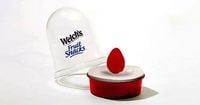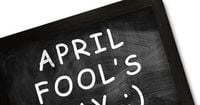April 1 is a day many dread, as it brings unexpected pranks and tricks that catch people off guard. According to CBS News, April Fools’ Day has been a tradition for centuries. But where did this playful day of mischief originate? And which pranks have earned the title of the best of all time throughout the years?
Historians say the holiday dates back to 1582, according to the History Channel. That’s when France switched from the Julian calendar, which marked the new year at the spring equinox around April 1, to the Gregorian calendar that has Jan. 1 as the start date. However, France failed to spread the news properly. The people who continued to celebrate the old new year became the joke of the town and were dubbed “April fools.” The tradition stuck and people began playing pranks on one another, which included placing a paper fish on someone’s back and calling them “poisson d’avril,” which is a symbol for a fish easily caught — or a gullible person.
One of the most famous April Fools’ Day pranks took place in 1957, when the BBC aired a program featuring a Swiss family harvesting a beautiful crop of spaghetti from their tree, according to Newsweek. The joke resulted in viewers calling in and asking how to grow their own spaghetti tree. They were told to place spaghetti in a can of chopped tomatoes.
In 1698, advertisements were placed announcing that the Tower of London would wash its lions, per Newsweek. This resulted in crowds of people gathering on April 1 to witness the event, only to find out it was never meant to happen.
In 1749, advertisements were posted claiming a man would perform the impossible and squeeze himself into a bottle, per Newsweek. Tickets sold and a crowd gathered, eager to witness the magic. As they waited, they soon realized the miraculous trick was a joke and no one was going to show up and perform.
In 1977, The Guardian published a travel article — a guide to the beautiful islands of San Serriffe, according to BBC. The article described the two islands, Upper Caisse and Lower Caisse, claiming an aerial view displayed the two islands forming the shape of a semicolon. The article went on to describe the academic life of the teenagers involved diving for pearls. This April Fools’ joke left many yearning for a tropical destination in a place that does not exist.
In 1996, Taco Bell claimed it had purchased Philadelphia’s Liberty Bell and planned to rename it the Taco Liberty Bell, according to the History Channel. Two years later, Burger King began advertising a “Left-Handed Whopper.” Despite the ridiculousness, customers still attempted to order the burger that never existed.
However, not all pranks have gone as planned. Some companies have faced backlash for their poorly executed April Fool’s jokes. Telling a joke is like striking a match. Do it well and you can keep yourself warm. Screw it up and you might accidentally set the drapes on fire. A bad joke can burn you, as some companies can attest after their April Fool's Day shenanigans failed to delight audiences and instead tarnished their brands.
In March of 2018, Elon Musk joked that Tesla was 'totally bankrupt' just days after the company’s stock had plunged. Investors weren't laughing when Musk tweeted that Tesla had filed for every chapter of bankruptcy — "including Chapter 14 and a half (the worst one)." This prank caused Tesla shares to drop another 5 percent, according to The Washington Post, with business experts openly questioning Musk's ability to lead the multi-billion dollar company.
In 2001, a Florida waitress at a Hooters restaurant named Jodee Berry was promised a new Toyota for selling the most beer on April 1, but instead received a toy Yoda. Berry was devastated and sued Hooters' parent company for fraudulent misrepresentation and breach of contract. The lawsuit was settled in 2002 for an undisclosed sum of money, according to the Orlando Sentinel, in which an attorney for Berry said she received enough compensation to "pick out whatever type of Toyota she wants."
In 2005, a California radio station, KBDS-FM, announced a Hummer giveaway but awarded a toy truck to the winner, Shannon Castillo. After being handed a fake car from a dubious contest, Castillo filed a real lawsuit against the station for $60,000.
Google also faced backlash in 2016 after its 'Mic Drop' prank went awry due to a coding error, leading to an apology from the company. The search engine announced a new Gmail feature, called the Mic Drop, that was supposed to make it easier to have the last word on any email. However, a coding error caused the Mic Drop to appear on emails unintentionally, prompting Google to issue an apology to dissatisfied users.
As brands continue to navigate the fine line between humor and offense, the legacy of April Fools’ Day remains a mixed bag. While some pranks are celebrated and remembered fondly, others serve as cautionary tales for brands looking to engage their audience with humor. In a world where social media amplifies every mistake, companies must tread carefully when crafting their April Fool's jokes.
This year, as companies and individuals alike prepare for the day of pranks, it’s essential to remember the origins of April Fools’ Day and the importance of delivering humor that resonates positively with the audience. After all, the goal of a good prank is to bring joy, not to stir up controversy.






